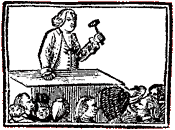Samuel Fitch Takes the Case
Jonathan Sewall wasn’t the only attorney missing from the big trials in Boston in the spring of 1770.
As the Massachusetts Superior Court geared up for the Boston Massacre trials, Ebenezer Richardson was having a hard time finding a lawyer to represent him.
Richardson was arraigned on Monday, 19 March, and brought out for trial that Friday. British law already recognized that a man charged with a capital crime deserved to have legal representation. But no attorney, not even those politically allied with the Crown, had agreed to represent Richardson.
That echoed how on 2 March the Customs service, as I noted back here, had publicly and falsely claimed that Richardson had “never been employed as an Officer or Under Officer, or in any Capacity in the Customs.” Killing a child had made the man even more unpopular than he already was. No one wanted anything to do with him.
An anonymous correspondent for the Crown reported on Richardson’s lament:
In 1768, Jonathan Sewall was seeking a successor to himself as advocate general in the Admiralty Courts, now that he was going to be attorney general. He approached John Adams with hopes of winning the younger lawyer to the side of the Crown. Adams later wrote that when he declined, he suggested that Fitch would be more comfortable in the job. Gov. Thomas Hutchinson eventually did give Fitch that permanent position.
The judges scheduled Richardson’s trial for 6 April. Fitch told the judges that he was feeling sick that month. Also, he had received an anonymous letter hinting at a valuable witness. The court postponed the trial to give Fitch time to investigate that information and decamped to Charlestown for a weeklong session in Middlesex County.
Richardson’s new trial date was Tuesday, 17 April. When the court convened that day, Fitch was nowhere to be found.
As the Massachusetts Superior Court geared up for the Boston Massacre trials, Ebenezer Richardson was having a hard time finding a lawyer to represent him.
Richardson was arraigned on Monday, 19 March, and brought out for trial that Friday. British law already recognized that a man charged with a capital crime deserved to have legal representation. But no attorney, not even those politically allied with the Crown, had agreed to represent Richardson.
That echoed how on 2 March the Customs service, as I noted back here, had publicly and falsely claimed that Richardson had “never been employed as an Officer or Under Officer, or in any Capacity in the Customs.” Killing a child had made the man even more unpopular than he already was. No one wanted anything to do with him.
An anonymous correspondent for the Crown reported on Richardson’s lament:
He observ’d to the Court that he had made application to almost every Lawyer in town to undertake his cause, which no one would do, that the Constables had refused summoning his Witnesses, that the Jailer, had used him in so cruel a manner that he was even frequently debarred the Liberty of conversing with his friends, that every Newspaper was crouded with the most infamous and false libels against him in order to prejudice the minds of his jury; that without Counsel, without the privilege of calling upon his Witnesses to support his innocence he was now to be tried for his life.The royal judges accordingly postponed the murder trial, which is just what the Boston Whigs were pressuring them not to do. They also tried to get Richardson representation.
The Court then made application to the several Lawyers present to appear as his Counsel but this one and all of them declined. The court finding that a requisition had no effect asserted their Authority and order’d Mr. Fitch the advocate General to appear on his behalf on his trial. Fitch made use of a variety of arguments in order to excuse himself which the Court did not judge sufficient. He concluded with saying that since the Court had peremptorily ordered him, he would undertake it, but not otherways.Samuel Fitch (1724-1799) had come to Boston from Lebanon, Connecticut, and Yale College. He was an established lawyer but not particularly prominent. Politically Fitch leaned toward the Crown, though not so strongly as to prevent him from representing James Otis, Jr., in his lawsuit against Customs Commissioner John Robinson.
In 1768, Jonathan Sewall was seeking a successor to himself as advocate general in the Admiralty Courts, now that he was going to be attorney general. He approached John Adams with hopes of winning the younger lawyer to the side of the Crown. Adams later wrote that when he declined, he suggested that Fitch would be more comfortable in the job. Gov. Thomas Hutchinson eventually did give Fitch that permanent position.
The judges scheduled Richardson’s trial for 6 April. Fitch told the judges that he was feeling sick that month. Also, he had received an anonymous letter hinting at a valuable witness. The court postponed the trial to give Fitch time to investigate that information and decamped to Charlestown for a weeklong session in Middlesex County.
Richardson’s new trial date was Tuesday, 17 April. When the court convened that day, Fitch was nowhere to be found.


No comments:
Post a Comment